Neal Gumpel
dr george pollard
Introduction
A hundred years ago, Albert Einstein didn’t know physicists believed E could not equal mc-squared. He wrote about the effects of E equaling mc-squared and changed the world. Einstein didn’t know he was supposedly wrong.
Neal Gumpel, the screenwriter, is similar. He’s a usual person around whom unusual events occur. “Many of the fictional screenplays he writes,” says Brian Linse, of Linsefilm, “happened to him. No one believes his life is the fiction he writes.”
During high school, Neal worked as a house painter. He developed a knack for high-end kitchen finishing work. As he painted, in Rye and Greenwich, he talked with his clients.
The talk was mostly about preparing food. Customers asked Neal to cater, and he did. Two years later, he went from house painter to caterer, with no training in either.
When Neal met his first wife, she was a bible student. He took up bible study to be with her. After they married, Neal became a minister, licenced by the State of New York.
When his marriage ended, Neal worked at Dean and Deluca, a trendy, high-end cafe, in New York City. Two years later, he opened a bistro in Kona, on Hawaii, called “A Piece of the Apple.” Two years later, Neal and second wife, Helen Shelby, the super model, returned to New York City, where he worked at the high-end Citarella Fish Market.
Two years later, Neal and Helen wanted to sublet their New York City apartment. Jim Sheridan, the film writer and director, came to view, with his daughter. As daughter, Helen and Neal toured the building, Sheridan noticed, on the coffee table, a story Neal wrote. He read it, while waiting.
Ten days later, Gumpel was the sensation of the Toronto Film Festival. Sheridan was saying, “Neal is my new writing partner.” Sheridan said his next project, which Gumpel wrote, was “Lucky Men.” Then Sheridan took Neal to Hollywood.
Mel Gibson, the actor, owns Icon Artists. “When Neal first came to Hollywood,” says Brian Linse, “Sheridan took him to Icon Artist for a meet and greet. Last person Neal meets is Gibson. They talk for a long while; Neal always has a steady stream of enticing ideas. When leaving, Neal shakes hands, with Gibson, and says, ‘Thank you, Mr. Costner.’”
This is Neal Gumpel. He writes the best screenplays, but knows little about Hollywood. "He knows almost no one in Hollywood," says Linse. "This is good."
“Neal pitched an idea to Bob Cooper, at DreamWorks,” says AJ Benza. “Cooper loved it. Neal got a six-figure development deal to write the script. The story came directly from the life of Neal Gumpel.”
“He’s a natural screenwriter, not studied,” says Brian Linse. “Neal doesn’t know he can’t write a scene this way or that. He decides what he needs. Then he does it.” Neal is two steps forward for Hollywood.
Neal Gumpel has an extraordinary life story. He tells it well. Read his first in-depth interview, now, to know why his basic instincts prevail.
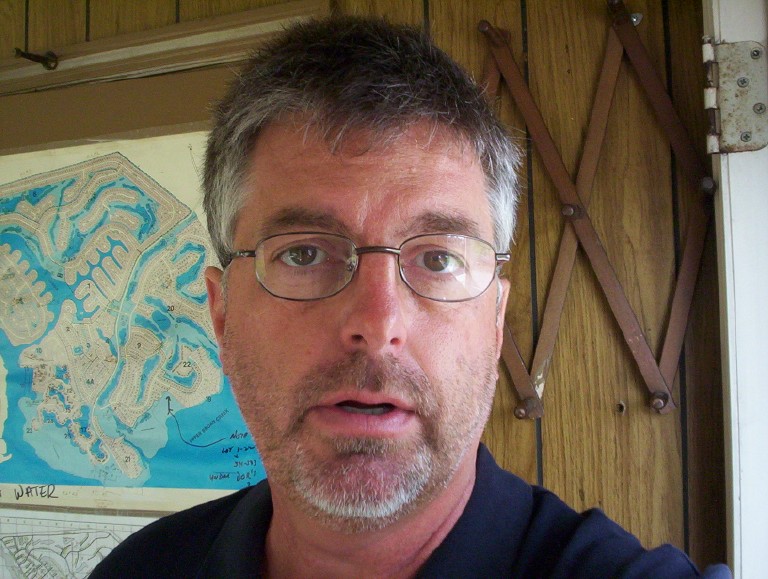
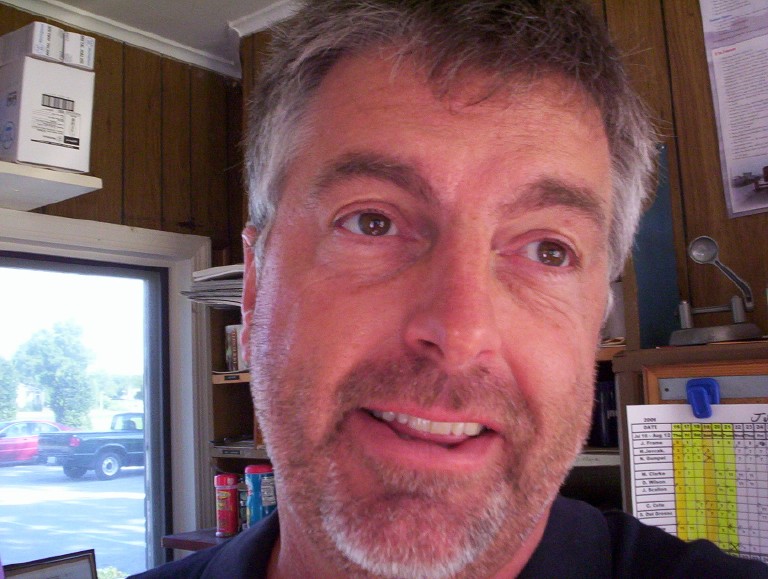
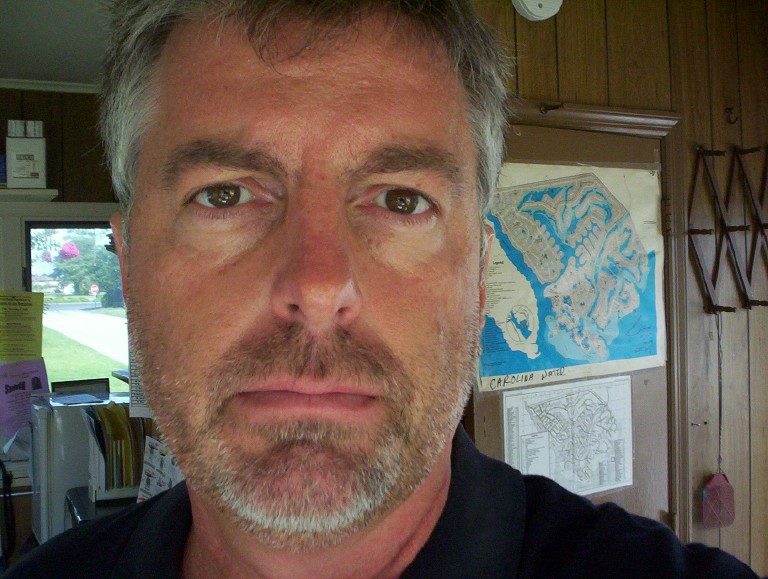
Show Me the Charcuterie
Grub Street (GS) You’ve done much, in half a lifetime. You worked the food business, religion and motion pictures. Can we start with food?
Neil Gumpel (NG) I had no training or idea about working the food business. I fell into it, as do many people in many lines of work. I started catering, as a favour, when I was young and that career went from there.
GS I know you lived in the New York area, when you were young, but where, exactly.
NG Westchester. I lived in. During and after I finished school, I was a house painter, mostly in Rye, New York, and Greenwich, Connecticut. I did high-end finish work on homes.
GS How did house painting led to cooking and catering.
NG That’s what happened; house painting led me into cooking. It’s crazy. I painted incredible kitchens, stocked full of high-end equipment and food.
As I painted, we, my customers and I, often talked about cooking. What’s the best way to prepare this or that? Eventually, a customer would say, “You should cater my Saturday dinner party.”
I got small catering jobs this way. Money was always tight; I was young, married and building a family. I earned good money painting, but catering made a better life for my family.
One catering job led to another. At twenty-eight years old, I moved from a high-end finishing painter to a caterer, untrained in either. Catering paid better than house painting and had more prestige.
Looking back, I loved food more than house painting. It’s likely a lot easier, on children, too, when they can say their dad is a caterer, not a house painter. The change, to food from painting, had many such side benefits.
GS The move was good all around.
NG Yes, and in ways you might not think. After I divorced, I dragged my behind around New York City, trying to decide where to work. I needed a good paying job to support my daughters and me.
One day, I decided to apply for a job at Dean and Deluca. It’s a fashionablecafe, in the Soho district, of New York City; it attracts the rich, famous and want-to-bes. Thecafe, on Broadway at Pine, is in lower Manhattan.
GS What motivated you to aim so high?
NG High-end painting paid well and there were jobs, a plenty, but I hoped not to paint more houses. I liked painting, but I wanted to work in the food industry. After catering, for a few years, I liked working with food.
I can’t remember who talked to me at Dean and Deluca. I do recall saying, emphatically, “I want to work here. This is the finest food store in the world, outside of a Harrods’s, in London, and then only maybe.”
The interview lasted a few minutes. Then the interviewer says, “Fine, start tomorrow morning. You’ll work the floor, as a prepared foods salesperson.”
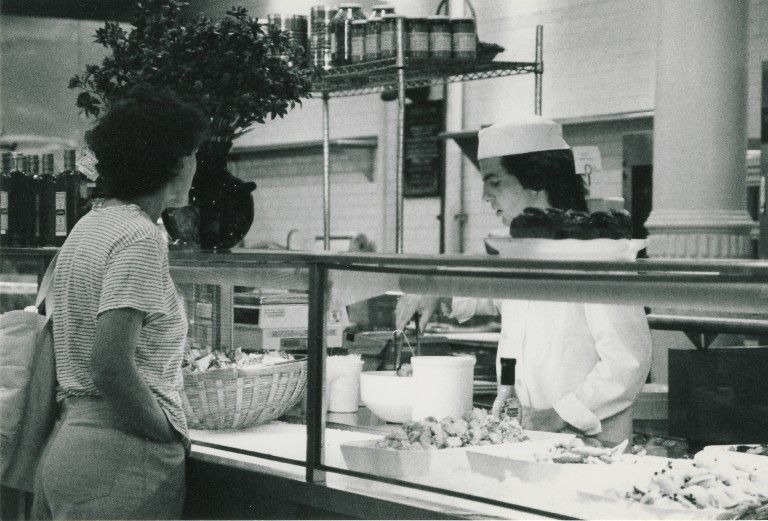
I fell into the heart of the food world, not as a chef, but as a salesperson. I worked the meat for fish counter at Dean and Deluca (above). Joel Dean, Giorgio DeLuca and Jack Ceglic were running the store they founded in 1977.
GS When did you start at Dean and DeLuca?
NG That was about 1990. Dean and Deluca was a stylishcafe. The food was exquisite and the atmosphere old European. Departments developed, such as wine, cheese and meats, where the customer service and food expertise were the best.
Working Dean and Deluca was marvellous! Movie stars came to the store; so did top models and journalists. As “Rick’s Place,” in the movie, “Casablanca,” everyone came to Dean and Deluca. It was the centre of New York City.
GS Who do you recall as customers at Dean and Deluca.
NG John F. Kennedy, Junior, came in almost every day. John Gotti, the mobster, walked through the doors, one day, and the police arrested him. It was his final arrest because those charges stuck. Models, Cindy Crawford, Helen Shelby and Christy Brinkley, were regulars. So, too, was Ed Koch, the former mayor of New York City, who is now an editorialist.
GS Food and Ed Koch, there are two words that go together.
NG Ed Koch is a character.
GS What did your job involve, at Dean and Deluca?
NG I worked one food counter or another, but most catered sales meetings or arranged the food for events. A new Broadway show or a book launch always involved wine and cheese or charcuterie. Charcuterie is a fancy name for deli meats. The best charcuterie, in the world, is at Dean and Deluca. Charcuterie includes dried meats, prosciuttos, German meats and so forth. Such events, built around charcuterie, were in high demand.
There was something for everyone, at Dean and Deluca. Diners from Broadway, publishing, politics, modelling and all areas of entertainment came for the charcuterie. If you wanted to see celebrities, women and men, who are stars, of one kind or another, Dean and Deluca was the place to go.
Dean and Deluca was a place to go when you visited New York City, too. There was a huge tourist business. Visitors, from all over the world, came to New York City for lunch or brunch at Dean and Deluca.
GS All this bustle in acafe that closed before 9 pm.
NG Yes, mostly a daytime business.
I fell into an A-list restaurant. Most important was what I learned at Dean and Deluca. Its departments offered an unusual chance to learn, much, all the time. Dealing with the hoards of celebrity customers was great, but what I learned was most important.
The meat department, at Dean and Deluca, is the best, in New York City. They also have the best cheese, in the world. Dean and Deluca hire only the best chefs.
I learned about the best, from the best. Working at Dean and Deluca was the best job I had, bar none. If I’d been saner, at the time, I likely never would have aimed so high and succeeded.
GS Dean and Deluca paid an unexpected bonus, I read.
NG Yes, it’s where I met my second wife, Helen. Dean and Deluca filled the first floor of a big, beautiful building. Upstairs were studios, of the top fashion photographers, and offices, of top modelling agencies. There were many famous women and men around, all the time, rushing in and out of Dean and Deluca.
One day, Kim Basinger, the actor, came in on her way upstairs for a photo shoot. She wasn’t wearing any make up and I didn’t recognize her. Many times, I didn’t recognize the models until their makeup was on.
My wife, Helen Shelby, was a top fashion model. She came into Dean and Deluca one day. We met and that great story began.
GS Dean and Deluca as matchmaker, that’s full service, I’d say.
NG Yes, but working at Dean and Deluca was better than going to the Culinary Institute of America times five. I fell into circumstances selling and preparing food, which game the chance to learn everything about foods. The on-the-job training was the best.
At Dean and Deluca, the chefs left at 4 pm. After they left, I became the Prepared Foods Manager until closing. That’s when I started cooking. A customer would say, “I need dinner for five or six people.” I took it on myself to jump into the kitchen and start cooking, without any authority, but a knack.
GS What did you learn working at Dean and Deluca? What’s the one lesson that stays, with you, today, from that job?
NG Well, this may sound horrible, but half of high-end food is presentation. This is especially true, now. Most restaurants carry the same products and presentation makes the difference.
Dean and Deluca took De Cecco Pasta, which you buy anywhere, and presented it well. Customers didn’t care about paying extra. Dean and Deluca did the same for all foods it sold: presentation, presentation, presentation.
GS Book by a cover seems the strategy.
NG Yes, Dean and Deluca had a neatly manicured appearance. The floors were white marble. Every employee looked perfect, not a hair out of place. Food presentation was the same.
A mix of presentation, quality and service means everyone is happy to pay top dollar. This is the Dean and Deluca philosophy. This is the most important lesson I learned, while working there.
GS You got into cooking on your own initiative or at least preparing meals.
NG Yes, it was because cooking is something I love to do. Therefore, I did it. When a department head leaves Dean and Deluca, he or she usually goes on to greater heights. Steve Jenkins ran the cheese department and is now a top authority on cheese; he had a show on the “History Channel,” the other night. This is typical at Dean and Deluca. I had a similar fate in the back of my mind.
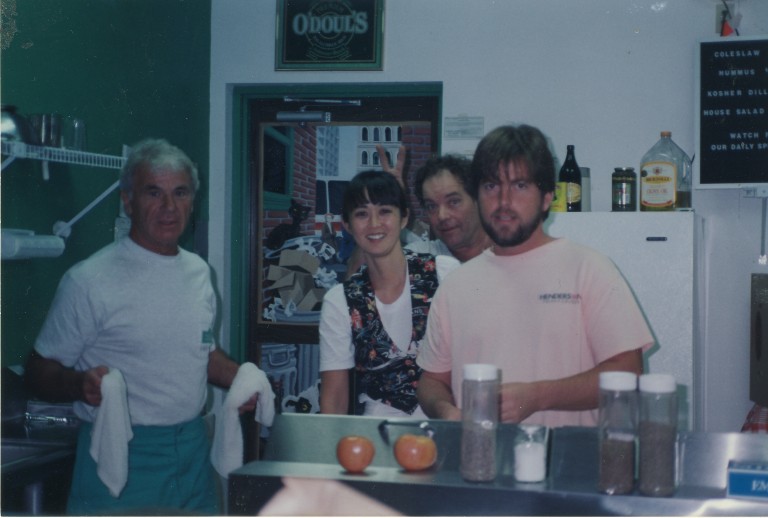
Helen (centre) and a bearded Neal, about 1993,
with two employees in kitchen of "A Piece of the Apple."
A Piece of the Apple
GS You went to Hawaii when you left Dean and Deluca.
NG Yes, I went to Kona, Hawaii, and opened a restaurant. My restaurant had ten tables. Every table was on the ocean.
GS What did you call your restaurant?
NG I called it, “A Piece of the Apple.”
GS What a great name, but why move six thousand miles to Hawaii?
NG My wife, Helen, is from Hawaii. We both needed a break, from the hustle and competition, of New York City. At first, I thought I’d get a job, at a major hotel or restaurant, but that didn’t work out. A great many high-end chefs shared my idea.
We, Helen and I, decided to take what money we had, about twenty thousand dollars, and open a restaurant. I used all the rules about food, which I learned at Dean and Deluca, to run “A Piece of the Apple.” There are few secrets to restaurant success, but many rules.
GS Can you give me a few examples of such rules.
NG Sure, instead of buying the ordinary pre-cuts, which every restaurant does, I spent a few pennies more for higher-end cuts. I made sure the freshness and presentation was perfect. I charged a little more, but gave a lot more. I learned this tactic at Dean and Deluca.
GS Naysayers must have been everywhere.
NG Yes, everyone said, “There’s no way this is going to work because most of the people living in Kona, on the big island, of Hawaii, are Asians. They don’t eat cheese. They don’t eat cold cuts. You’re not going to be able to sell any kind of high-end charcuterie sandwiches. There’s no market, on Hawaii, for high-end food products.”
I said, “Well, I don’t want everybody on the island to come to my restaurant. There are 100,000 people on the island. I need 10,000, maybe fewer, of them to come to my place, now and again.
GS You did have only ten tables.
NG Exactly, and I said, “I need the haloes, the visitors, the German tourists and so forth, to come to my restaurant.” That’s exactly what happened. I had a loyal following of people thrilled to have Schaller and Weber meat flown from New York. We had a great time running a restaurant for a couple of years, from 1992 to 1994.
GS Did you sell it or close “A Piece of the Apple”?
NG I sold. Several customers, from California, owned a group of “Taco Bell” franchises. They thought my restaurant was a franchise waiting to happen.
I didn’t agree. I said, “It’s not going to work because this restaurant has a personal touch.” The potential buyers disagreed.
“No,” they said, “we’re going to franchise the concept.”
I didn’t want anything to do with a franchise and I sold. The new owners opened a second location on Maui. They weren’t able to keep the idea going.
GS What did the new owners do wrong?
NG They dropped the daily fresh bread, which was a specialty, of “A Piece of the Apple.” They also dropped the daily fresh herbs, I used. The personal touches disappeared quickly, too.
In time, they sold both locations to someone, who kept it going for a few years. All the locations closed by 2005.
GS You said “A Piece of the Apple” was right on the oceanfront, in Kona.
NG Yes, if the big surf was high, we had to wash the windows, at the front of the restaurant, at least a couple times a day. It was a wonderful restaurant. Helen and I had a great time running it.
GS If “A Piece of the Apple” was doing well, why even consider selling.
NG Well, the reason I sold the restaurant was my daughters. They were back in New York City. The distance strained our relations.
I missed my daughters. I didn’t want to be 6000 miles from them, all the time. Travelling to New York, from Kona, and back was difficult.
Whenever I wanted to go to New York City, I had to close the restaurant. You can’t close a restaurant for two weeks, especially on Hawaii. The clientele dries up, thinking you’re unreliable or out of business.
The vast distance became a hardship. I sorely missed my daughters. They weren’t able to visit Hawaii. I had to go to them. For that reason, we sold “A Piece of the Apple” and moved back to New York City.
Mongering Fish
GS Did you stay in the food business when you got back to New York City?
NG Yes, back home, I worked for the Citarella Fish Company. Citarella is a high-end fish store, on the Upper West Side, corner of 74th Street and Broadway. The owner, Joe Gurrera, knew me from Dean and Deluca. He hired me as a fishmonger.
GS A high-end fishmonger, is that an oxymoron?
NG Yes, I guess, but Citarella was another remarkable job. I learned so much, every day. The clientele was high end, too, including top Manhattan restaurants, such as Lutece and Chanterelle, celebrities, Wall Street investment bankers and so on.
Now, you must know this about me. I like to live as close as I can to where I work.
GS Most of us prefer to live as far away from work as possible.
NG Yes, but not me, I like to walk out my door, take a few steps and I'm at work.
When I worked at Citarella, I lived a block away, on 73rd Street. I got up late, made it to work early, came home for lunch and on time after work. It was a good life.
GS When did you work at Citarella?
NG About 1994 to 1996 or so, I’m not that good with history.
GS You’re a two-year man.
NG Yes, that’s about my attention span. I would’ve stayed with Citarella. I loved everyone who worked there. A great company to work; everyone’s well treated. About this time, Hollywood fell into my life.
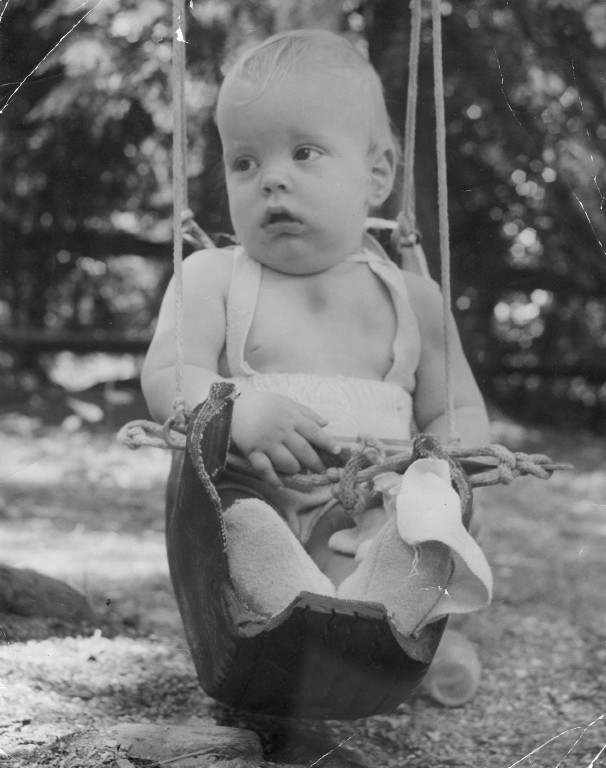
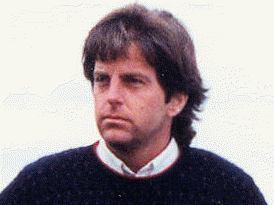
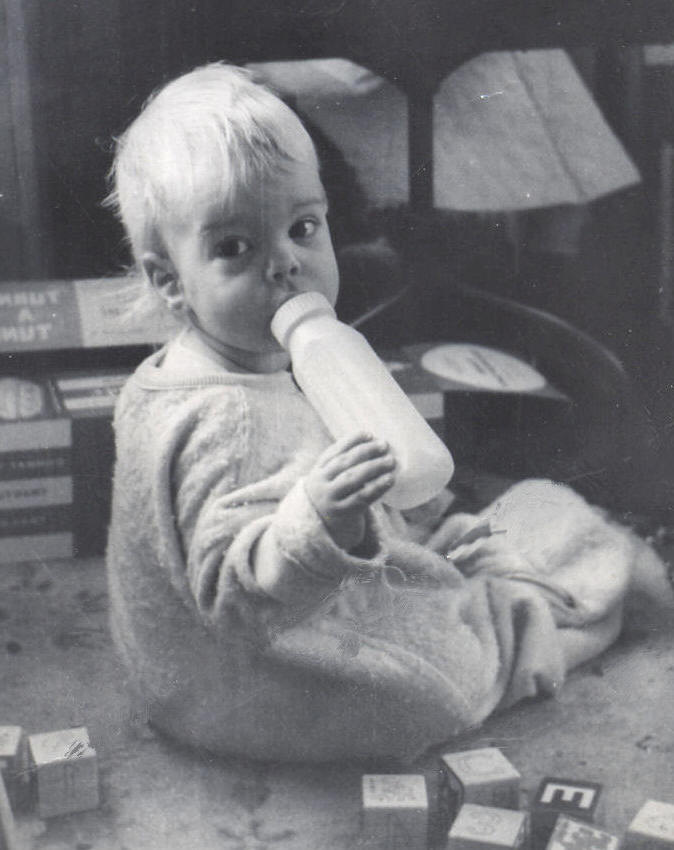
Receiving the Sacraments
GS You mentioned, when we first talked, that religion was once a big part of your life.
NG Yes. Well that’s a huge story and morbidly funny.
GS What attracted you to religion?
NG By birth, I’m an Irish Roman Catholic (RC). As a child, Catholicism ruled my parents and their home. I went to Our Lady of Mercy Elementary School. My family went to church, every Sunday, took Communion and went to Confession, regularly.
My father was a prominent cardiologist in Rye, New York. I grew up in a big beautiful Victorian house. My parents had ten children. Ours was a good Roman Catholic family, true to the Vatican.
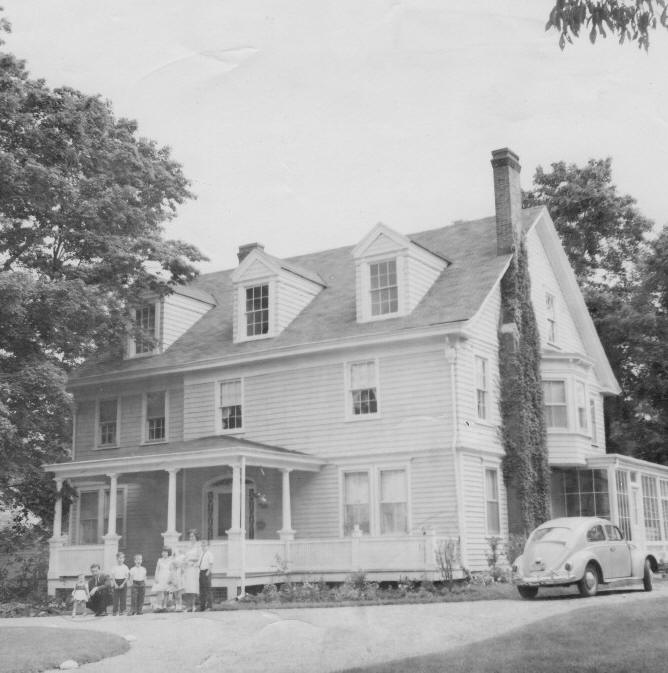


Gumpel Family Home, about 1970, Port Chester, New York.
GS You have nine siblings, good grief.
NG Yes, there were four boys and six girls. Every one of us is alive and kicking, as are my parents. We’re the Kennedys, of Port Chester.
GS You’re the dynasty of Port Chester.
NG That’s funny. As a child, I obsessed over religion. The big ole bible was always sitting on the shelf. Way up, at the top the bookshelf was the King James Bible, with pictures. Those pictures, of Noah and the Ark, the Crucifixion and so forth, were scary for a six-year-old.
This Bible impressed and scared me. I tried to look through it, but rebuked, by my parents, for it. The RC Church discourages members from reading the bible. Sneaking a look, at the bible, was a form of childhood rebellion, I guess.
GS RCs don’t consult the bible, as they might discover truth.
NG Yes, teachers and clergy told us to read the Catechism or risk damnation. The event, which turned me off Catholicism, happened when I was receiving the Sacraments. Baptism is the first sacrament. Confirmation is the second. First Communion is the third.
When an RC child prepares for First Communion, she or he also goes to Confession, for the first time. Confession was scary, for an eight-year-old child. I had to go into a dark box, kneel down and wait for a middle-aged man to open a screened window. When he opens the window, he asks how bad you’ve been.
GS It is scary and weird; I remember it well and unwillingly.
NG I’m preparing for my first Confession. A nun, Sister Theresa, says, “You go i n to the confessional.” It’s a tiny, stank, dark room where gawd, the devil or both lurk. “And kneel down” she says.
"When Father Malachi opens the window, you say, 'Forgive me Father, for I have sinned. This is my first confession.'
"Then," says Sister Theresa, “tell Father Malachi all the bad things you’ve done.” Immediately I say, silently, so only I can hear, “This is the scariest idea I ever heard.”
I say to Sister Theresa, “You’re kidding!”
She says, “No. You all line up, go into the box and confess your sins.”
Next day, the nuns bring us to the church, again. It’s two days before our first Confession and we need practice. We line up, girl, boy, girl boy and so forth, and go over the instructions.
GS Catholic kids start early, learning how to line and otherwise conform.
NG The day arrives for our first Confession. We line up, readying to clean our souls before First Communion. I’m wary, if an eight-year-old knows how to be wary.
My turn comes. I walk, shakily, into the box and kneel down. I hear the door, on the window, slide open and see Father Malachi through a wooden screen.
He says, “Neal.” He knows who I am. “Nealy Gumpel,” he says, “what did you do wrong?” I start to cry. I’m terrified.
I say, “I don’t know? Nothing?”
GS That’s exactly what I said too! I was six or seven. What wrong could an eight-year-old do?
NG I didn’t know what he was talking about and he says, “Well, did you lie to your mother and father?”
I say, “Yeah, I did that, I guess. I had no idea if I lied to them or not.”
Father Malachi says, “Did you think bad things about your parents?”
I say, “No,” and I hadn’t.
The interrogation continues, this way, for a while. Then Father Malachi says, “Is there something else you do, when you’re alone, that’s bad?”
Wondering what he’s talking about, I say, “No.”
He says, “Nothing, when you’re alone that you do that’s dirty?”
I didn’t know what he was asking. He’s terrifying me. I didn’t discover my penis until I was twelve.
He keeps asking. The more he asks the more he scares me. By the end, of my first Confession, I’m an eight-year-old wreck.
GS It’s a universal RC experience.
NG I guessed it was, but I had no idea what he was trying to get me to admit. He told me to recite “Three Hail Marys and four Our Fathers.” This was to repay gawd for my sins.
That was the last Confession I gave. After that experience, I knew something stank. I stayed away.
Next day, the nuns return us to church. We’re going to practice for First Communion. The lineup is the same, girl, boy, girl, but this time we’re at the altar. Sister Mary-Margaret tells us to put our hands together, to form a steeple.
The church was huge and beautiful. I’m looking at the statues and the leaded-glass windows. Despite my Confessional experience, I’m impressed.
Suddenly, Sister Mary-Margaret says, “Kneel.”
I said, “What?” I thought she was calling my name. Everyone burst out laughing.
Sister Mary-Margaret comes roaring down the aisle. She smacks me in the head, with a bell. She thought I was being a smartass. I learned to expect all nuns had a bell, in their hand.
That was it for Catholicism, in my life. An unusual grilling, by a priest and a beating by a nun were enough for me. An eight-year-old can only take so much.
I did make everyone laugh. This was good. I discovered I could be stupid and funny as well as a school hero.
The Bible, Redux
GS The way you tell it, one would think you had it with religion, for good.
NG Not so, my Sacramental experience is the beginning. I became a troubled teenager. I had many problems, which returned religion to my life.
I was a terrible student, low grades or no grades. In my family, if you didn’t do well, in school, there was trouble. Most families, in the 1960s, thought the same way, I think.
Today, someone would say I had learning disorder. I’d get special attention, have my own tutor and take the short bus to school. I wouldn’t be able to write, either, or think.
As a teenager, I was vulnerable to drinking and drugs. Drinking was a huge release. I loved to drink. Once I started, when I was twelve or thirteen, drinking made me feel great.
The craziest part is I still obsessed over religion, in a weird way. I was in such a bad state of mind. In retrospect, it seems anyone, who takes a drastic turn, in the religious part of life, falls into a bad state.
I was in high school, now. My ability to bullshit my way through life was improving. I had a garage band, which was hot, and I was popular, if in an unusual way. I became the Senior Class President, of Port Chest High School, on a lark.
GS Now, that is funny.
NG Yes and this was a big high school. I ran for Class President of a huge high school, Port Chest High School, and I won. A bad joke came to life.
GS It’s a good omen for winning an Oscar.
NG It gets worse. About the same time, September 1974, I met a young woman, my age. She was a doll, a cute woman. I fell for her.
She was crazy about me, too. At that point, in my life, I was ready for someone to treat me well and she did. She became my wife, a year or two later.
The only catch was she studied the bible. She wasn’t into my shenanigans. Right away, I’m say, “Hey, let’s go out and get drunk and fool around.”
She says, “I don’t do that!”
I say, “What? Why not?”
She says, “I study the bible.” She was in a bible group. She says, “The bible tells us not to get drunk. The bible tells us not to mess around before marriage.”
I say, “What?”
She was adorable. She was cute. I don’t want to lose her. I say, “How do we get around this?”
She says, “You can come and sit in my bible study class, with me.”
I think and say, “I’m not ready for that, am I.”
It was the right time or something. I went to her bible group. I was a crazy long hair in jeans, but I went to her bible study group.
GS This was a 180-degree turn for you.
NG Yes, someone hosted the study groups, in their home. Everyone was “too nice.” In a sense, it was how I imagined a cult, but nothing out of the ordinary was said or done.
GS Seems different from the rest, of your life, at this point.
NG It was refreshing. I always sensed a vacuum, in my life, and the people, in the study group, were “so nice.” In the 1970s, cults were all over the place. My other friends would say, “Oh, you’re joining a cult.”
I’d say, “No, it’s not a cult. It is women and men, who are into the bible. They’re ‘too nice’ to everyone, including me. What’s the problem?”
I dove back into religion. I shaved my head, after only a week or two in the bible study group. I stopped taking drugs and drinking. All that crap fell away, right away.
I fell madly in love with this woman. I was 19 years old. I proposed to her. I told her I’d marry her. I meant it, but, let’s face it, this was only way I could get her to fool around. Religion or not, fooling around was still on my mind.
As I said, earlier, my fascination, with the bible, went back to my childhood. The study group wasn’t that much of a leap and more a renewal. I started delving, deeper and deeper, into the bible.
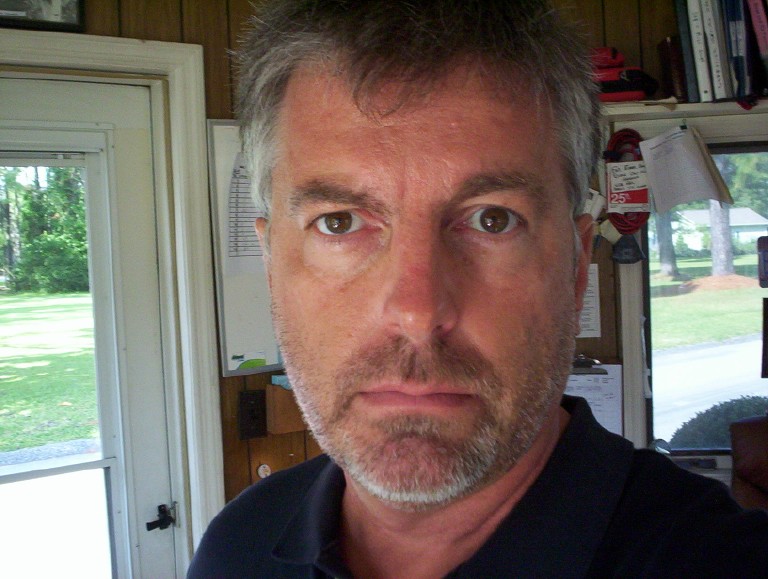

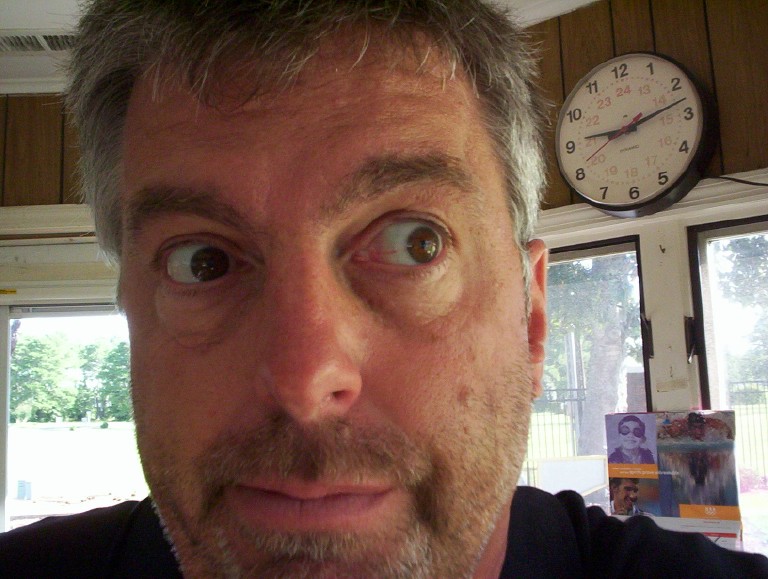
The End of the World Cometh
GS I’m sensing a twist is coming.
NG I’m senior class president, with long hair. I’m a pothead and a musician. This is in September 1974.
By November 1974, I have a crew cut. I’m never without a bible; it’s always in my hand. I’m telling students and teachers the world will shortly end.
I don’t know if it was coming off the drugs and booze or not. I sensed, I knew, the world would end, in a few weeks. I was willing to bet my life on the world ending on 11:59:59 on 31 December 1974.
On Tuesday, 31 December 1974, I take my fiance into New York City. We go to Central Park, to await the end of the world. She says, “Are you sure?” I say, “Trust me; gawd will intervene, tonight, to end the world. It’s in the bible.”
We sat on the snowless grass until midnight, when the New Year’s Eve revelry breaks out, all around us. We look at each other. We wait a while longer. Five minutes into 1975, I go into a sweat.
“Wait a minute,” I say. “You sure your clock is right?” We’re well into 1 January 1975. The world still exists. What’s going on?
One of the “too nice” people, with whom we studied the bible, was with us in Central Park. She says, “I believe in the end of times. I don’t think it’s now, though.”
I say, “No, trust me.” I had gone to the Prophecies. I worked up a mathematical prediction. I broke down all the clues in my mind. Even the people around me, those who were into the bible, too, were telling me to cool my jets, but I had it in my head and couldn’t let go.
GS What was the fallout of your prediction gone wrong?
NG Here’s the practical result of that mania. My main task, as Senior Class President, of the high school, was to plan the spring prom. I knew the world would end five months before the scheduled prom. Why plan, for a prom, when I had to plan for the end of the world.
The principal asked me about the prom. Students and teachers were pulling me aside, saying, “Neal, look, we’re happy about your conversion and renewed beliefs, but you better plan this prom.” I declined.
“No, you don’t understand,” I’d say, “gawd destroys the earth before the prom. Gawd is going to wipe out humanity and remake the Garden of Eden.” I had facts, numbers, references. How could I be wrong?
GS Now, you had to arrange the prom.
NG A few days later, back at school, in January 1975, I’m running around like an insane person, trying to throw together a prom, at the last minute. I couldn’t find an arena or hall to host the prom. This is 5 January.
No acceptable prom band is available. The only live music I could find was a ‘Led Zeppelin” and “Emerson, Lake and Palmer” cover band. This meant no dancing at the prom.
My high school prom, for 1975, is the worst prom in the history of the United States. I left Port Chester shamed. I hear, when they have reunions, the 1975 prom is a big laugh.
GS The worst prom in US history is an accomplishment.
NG At Port Chester High School, students, today, continue to talk about the 1975 prom. I never went back to a reunion. If I go to a reunion, they'll beat me up. I barely escaped a mob beating, at the prom. Everyone was rightly upset.
Give Me that Ole Time Religion
GS They didn’t invite you to reunions, how tawdry.
NG Good part is I was deeply in love, with my wife. We married, shortly after high school, despite the prom fiasco. Once married, we led a strict Christian life.
We raised our daughters in the faith. I got into it, deeply. I started studying Hebrew and Greek. I wanted to know who translated what parts, of the bible, when and where.
I became a licenced, ordained minister, at 21 years old. I performed marriages, offered religious counselling and oversaw funerals, in New York State.
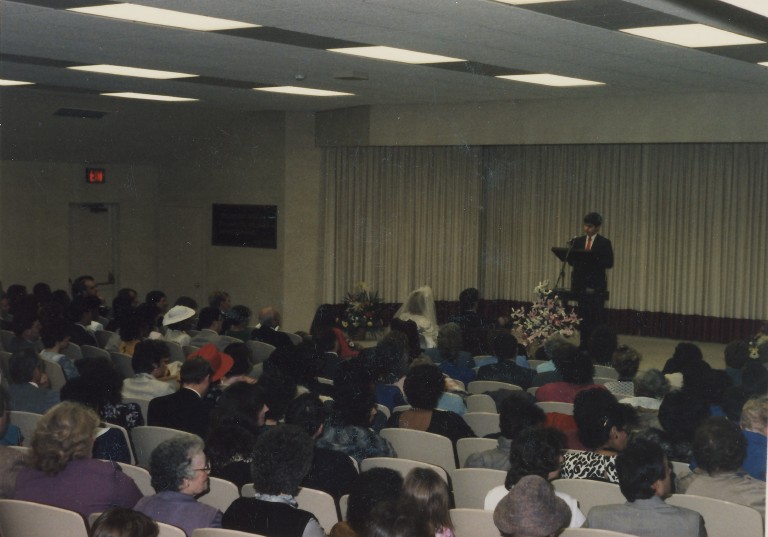
Neal ministering about 1985
GS What religion ordained you?
NG That’s the catchy part. I helped a few, let’s say, congregations. I was living in Rhode Island, working with groups locally and in New York City and Connecticut.
GS What were the names of these religious groups?
NG Well, I dealt with Jehovah’s Witnesses (JW), mostly. I was with JWs for a long-time. I learned much from the JWs, but I ventured into different areas.
As you might expect, I was independent. That’s why I’m hesitant to say I was a member of this or that specific religion. No religion fulfilled my curiosity or met my standards.
I needed to know every detail. I needed autonomy. These needs caused me many problems.
Eventually, my thirst for autonomy, knowledge and independence got me in trouble with the JWs. I thought JWs were the greatest people in the world. I thought JWs had great insight.
GS The JWs kicked you out.
NG This was all right. I quested much of what I learned from the JWs. I questioned some teachings and practices. I never fully blended. Most churches ousted me because I questioned too much.
GS What did you question?
NG When a group forms, say as a religion, rules arise. Do this and don’t do that, otherwise it is chaos. These are human-made rules.
In the blink of an eye, the religion is a human product. Its purpose is to follow human-made rules and achieve goals set up by humans. Maybe gawd expresses him- or herself through humans, I don’t know.
My position has long been that you read the bible. You think about what you read. You decide what to do and how to live your life.
If you decide, say, Jesus walked the earth to save humanity, that’s fine. If you decide, Jesus is a good role model, follow him. Do what he did, not what human-made rules and goals prescribe.
GS Rob the money changers.
NG Yes, beat the crap out of the money collectors. I’m only kidding. Still, if you do what Jesus did, you’ll be fine.
When Jesus began preaching, he condemned formal religion. He said, “God doesn’t dwell in man-made temples. Cut the crap, go off and help others learn to act properly. Take care of your family, be good to your neighbours. Treat everyone well and fair. Stop judging one another. Do good works.” That was his message.
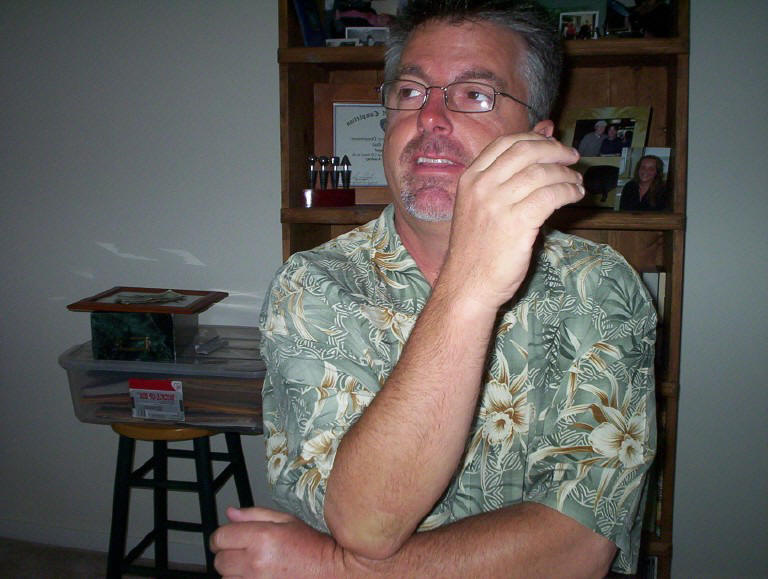
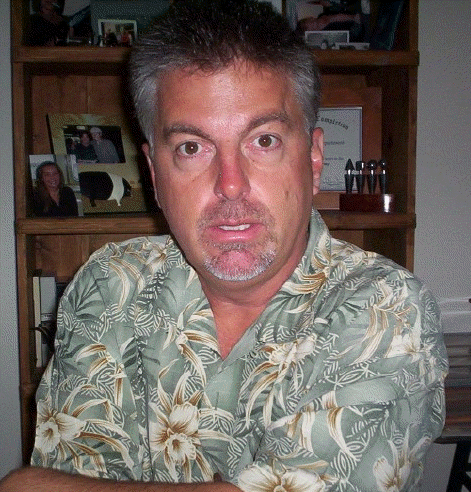
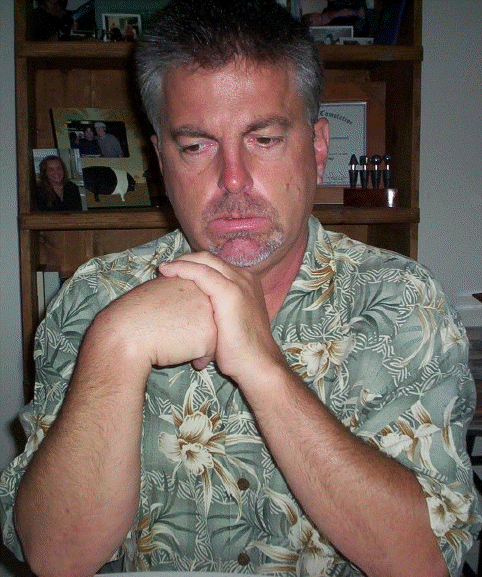
GS He was asking for much, in the form of a civic morality.
NG Yes, he was great. Even non-Christians grant Jesus was a great person. He did great deeds. Jesus po’d everybody involved in organized religion by questioning its legitimacy.
GS For such common sense, he endured, physically, what the rest have endured, symbolically, ever since. What impressed you about the Jehovah Witnesses?
NG The almost total neglect for money issues impressed me, most. JW ministers receive no pay. They never ask for money, except, perhaps, to buy supplies to build a meeting hall.
Other religious groups, with which I worked, had salaried ministers. Out of need, money was a big concern. The clergy urged members to give money, all the time.
In some religions, ministers must reflect the status of parishioners. A wealthy congregation wants its religious leader to drive an expensive car and wear top quality clothes. Money is almost the only point.
GS I know of a Presbyterian congregation, in Toronto, that arranges for its minister to drive a new Jaguar, each year, on a one-dollar lease. This congregation also funds high-end clothing for him and his family.
NG Right, presentation not content, is emphasized. The JWs were scholastic. They were smart in many ways. Insight was a major goal.
Eventually, the JWs didn’t want me around. I felt some of the more personal decisions, such as telling members exactly how to act, were not right. It was time for me to leave the JWs.
GS Can you give us examples of prescribing and proscribing.
NG Sure, a religion shouldn’t tell a member not to smoke because it’s against the word of gawd. Smoking is an individual decision. The wisdom is not to smoke, but you can’t teach anyone anything, she or he must learn, even if it’s a hard lesson.
Is it wrong to celebrate a birthday? JWs don’t celebrate birthdays or much of anything, for human-made reasons. They may celebrate Easter, in a way.
GS Human-made rules in the name of gawd.
NG Yes and it’s not a JW specific concern, my central point goes far beyond any one group. A formal religion soon loses sight of its purpose. Choosing to wear a beard can ostracize.
The car a woman or man drives can lead to serious, harmful judgments about her or him. A BMW suggests too much aggression. A Toyota suggests the driver is not a patriot. The list goes on.
GS I get the impression smaller religions are not ready to reaffirm the individual by celebrating a birthday or allowing personal decisions.
NG Yes.
GS In that sense, formal religion protects itself, as a group, the interests of the group, at the expense of the individual.
NG Yes, certain religious groups have an ascetic, a collective attitude. JWs drink alcohol, but the Pentecostals don’t believe in alcohol. How can you think wine is not all right? The greatest miracle performed, by Jesus, turned water into wine.
Religious problems are human-made. You can trace many of these ideas to the time of Constantine (280 to 337 CE). At this point, for example, the Catholic Church refused to allow priests to marry.
Many priests came from wealthy families and were heirs to large fortunes. The wife or children, of a married priest, could claim his estate, when he died. The Church wanted his estate, to help fund its expansion and domination. In the 6th century, the Roman Catholic Church reaffirmed this decision, based on some unusual ideas about women.
GS The Apostles married.
NG From the Protestant viewpoint, yes, the Apostles had wives and children. Mary, too, had other children. The bible is clear that Jesus had siblings. James was his brother. The myths, about Jesus, Mary and Christmas, were built in the Dark Ages (about 700 to 1400 CE). The Roman Catholic viewpoint continues to hold on to these myths.
GS How did you eventually become a minister? Who licensed you or whatever?
NG My licence to minister came from the Town of Port Chester, New York. I had a congregation provide a letter of support. I went to the town hall, with the letter, applied and received a licence.
The licence showed I was a “Minister.” I could legally marry a couple and engage in other sanctioned ceremonies. The State of New York legitimized me.
GS Wow.
NG It wasn’t hard to do.
GS It doesn’t sound as if it was hard. How many weddings did you do?
NG I performed maybe a dozen weddings and a few funerals. I did that until about 1989 or so. Mostly, I ministered, on my own; I believe ministering is a personal decision and task.
GS Why did you decide to leave the ministry?
NG It all ended in one big explosion. My wife and I were leading a pious life. I was a minister, doing some high-end house painting and catering, too.
GS You were living a pious life.
NG I couldn’t have been happier. I was the father of three daughters. I was happy. I was raising my daughters in the faith. I had a great family.
Then there were sudden problems in my marriage. These problems caught me off guard. I believed I was the last one, in the world, to have a marriage problem.
One day my wife tells me she’s not happy. She had missed too much of life. She married too young.
The poop hit the fan. A divorced minister is unwelcome. The divorce was terrible. A minister, with a messy divorce, is the least welcomed.
The time came to move on. I went off, thinking I had earned a burn. If I’m going to fall from grace, let me fall all the way.
A Model Story
GS What did you do?
NG I went haywire. I said, “You don’t want to be married to me. That’s fine. You think you missed a life. Let me catch-up on what I missed, too. I went crazy, in a way.”
I did it all. I was upset. I went a little insane. I had all of Manhattan, readily available. I had such fun. I had much fun for a couple years.
GS There seems patterns, in your life, of falling into great job and a couple of years doing this or that. Did you fall into screenwriting?
NG Absolutely, during this time, I worked at Dean and Deluca, met Helen and moved to Hawaii. When we returned to New York City, from Hawaii, I fell into the job at Citarella. Helen stayed semi-retired.

GS You mentioned Helen had been a top model.
NG Yes, when I met her, she was modelling for Calvin Klein, Bill Blass and other big fashion houses. She was the Leggs Pantyhose woman, for years. Do you recall the Japanese woman, who did those advertisements? That was Helen (above). She worked with Japan Airlines, Oil of Olay, Clairol and was all over television. She was the first Asian used in a campaign, after the Vietnam War.
GS I never thought of the connection between models and the Vietnam War.
NG In 1975, after the War ended, no US business would use an Asian model, even if American-born, as is Helen. Eileen Ford, of the Ford Modelling Agency, found Helen, in London. Helen had married British photographer, Richard Shelby.
Ford brought her to New York City. She introduced Helen around and got her much work. Helen opened the door for Asian models, in the USA.
Lucky Man
GS Can we talk about how you got into screenwriting.
NG Sure, Helen and I are back in New York City. I’m near my daughters. I’m working at Citarella. I’m happy as a clam.
Still, a time came when we decided we wanted out of the City. We planned to move east, toward Connecticut. This would also get me closer to where my daughters lived. We put our apartment, at 73rd and Broadway, near Citarella, up for sub-let.
About this time, I was missing the self-expression that had been such a huge part of my life. I was always preaching, some way or another, about gawd, food or house painting. When my daughters were small, I wrote poems and short stories for them.
GS Did you consider writing a book?
NG Yes, a book was an early urge, but I didn’t have the knack. I didn’t have a sense about how to write a book. It’s not a simple or straightforward task.
Yet, I had an overwhelming urge to express myself, in some way. One day, I said to Helen, “I have to write to something. I don’t care what. I have to write something.”
We went up on the roof of our building, the Antonia, a big, old beautiful building. Helen sat down, with a pen and yellow pad. I started pacing and telling a story. She wrote the story I told.
GS Do you recall the story?
NG It was a true story, mostly. My friends and I stole a car to go to an “Emerson, Lake and Palmer” concert, probably at Jones Beach. We borrowed a car from someone who was out of town. I called the story, “Lucky Men.”
I had no idea what I was doing. It took about three days of manic storytelling, by me, and frantic writing by Helen. She humoured me, believed in me and made it happen.
At one point, Helen said, “You are an amazing writer! When you tell stories, it’s captivating. Helen encouraged me to fill 100 pages, with drama and a moving ending.
“Now what do we do with it,” I say. Helen says, “I don’t know. It doesn’t read like a book.” I threw it on the coffee table and the yellow pad slipped from our minds.
There was a steady stream of women and men through our home, hoping to sub-let. In New York City, renting is a nightmare and distracting. Sub-letting, with strangers parading through my home, is not my idea of fun.
GS Sub-letting is a horror story everywhere.
NG One afternoon, a smallish Irish person comes, with his daughter, to view the apartment. He was some character, touching everything as he looked over the rooms. I ask, “Do you want the place or not?”
He says, “It’s for my daughter. She’s going to be living in Manhattan. I live in.”
I say, “Fine,” and we show his daughter the building. We go to the laundry room, show her where to leave the garbage, where the superintendent lives and so forth. The father waited in the apartment.
When we come back, to the apartment, the father is sitting, on the sofa, reading my 100-page story, off the yellow pad. “You’re a writer,” he says.
“No,” I say, “I work at the fish market, next door.”
He says, “Oh no, you’re a writer!”
“Sure,” I’m thinking, “soft-soap the renters to cut the price.”
“No, you’re a great writer. This is an exceptional screenplay and I’ve only read 20 pages!”
I say, “What’s a screenplay?”
“A movie, this is a movie,” he says.
This is almost over my head. I say, again, “Do you want the apartment or not?”
He looks at his daughter and says, “Yes, we want the apartment.” He takes out a roll of cash and counts off rent for the first month and a security deposit. Then he says, “Do you know who I am?”
I say, “No?”
He says, “I’m Jim Sheridan.”
I didn’t go to movies. I knew nothing about the art world or the film business. I didn’t have a clue what about indie films. I knew nothing.
Then Helen says, “Wait a minute, Jim Sheridan?” She knew his name from her modelling days.
He says, “Yeah, you must’ve seen my movies.” He produced or wrote “My Left Foot,” “The Boxer” and “In the Name of the Father,” to mention three. Sheridan is an A-list movie producer and writer.
He says, “Do you mind if I take this with me?” He’s pointing at the script. “I’ll return it.”
I say, “Sure, take it with you.” I figure it’s the last time I’ll see the yellow pad, but I had the money for the apartment. My immediate concern satisfied, I didn’t care about the yellow pad.
GS Interesting fall into a career.
NG No kidding, a week later, a Sunday evening, I’m doing a shift at Citarella. One of the office workers yells to me, “There’s a phone call for you.” I pick up the phone. All I hear is, “Neal, it is Jim.”
The voice is a distant memory, with a brogue. I say, “Jim who?” Of course, it’s Sheridan, who says, “I need you, in Toronto, in the morning.”
I say, “Toronto, what are you talking about and why?”
Sheridan says, “I’m doing your movie!”
I say, “You’re doing my movie? Hold on a minute. What movie, of mine, is he doing?” I have no idea what to think or say.
At that moment, standing in front of me, hoping to buy fish is Peter Scolari. He portrayed Michael Harris, on the “Newhart” show, in the 1980s. Mostly, he’s a theatre actor in New York.
Scolari was a regular customer. I feel comfortable with him. I say, “Do you know Jim Sheridan?”
He says, “Of course,” and he starts rhyming off Sheridan movies.
I say, “Sheridan is on the phone, right now. He wants to make a movie from a story I made up. He says I should quit my job. I need to be in Toronto, in the morning.”
On the phone, Sheridan says, “How much money do you need to walk out of there, now?”
I was having financial problems, at the time. Sheridan posed a difficult question, demanding an immediate decision. Finally, I say, to Scolari and Sheridan, on the phone, “I would need $10,000 to walk out of here, now.”
Sheridan says, “I’ll give you $10,000, in the morning. Get to Toronto! In the morning, I’ll have a car pick you up and take you to JFK, where the plane tickets are waiting. When you get [to Toronto], I’ll take care of everything.”
Scolari says, “Go!”
The next morning I’m part of the Toronto Film Festival. I land in Toronto and a stretch limousine picks me up. I don’t know what I’m doing or where I’m going. I have a room at the Four Seasons Hotel, on Avenue Road, in the middle of the Film Festival.
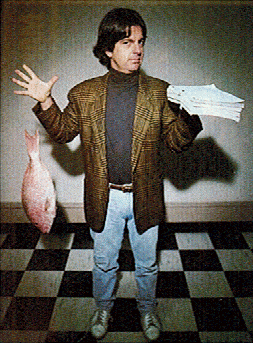
Fish into words, not loafs of bread
from "New York Magazine" 10 January 1997
Sheridan is showing me around, introducing me to everyone. He’s saying I’m his new writing partner. He’s going to be doing my movie, next, he says to anyone who’ll listen.
Ten minutes, after arriving, at the Four Seasons, I’m sitting alongside Kevin Bacon and his wife, Liam Neilson and Jim Sheridan. We’re having coffee.
It was surreal. Sheridan gave me the money he promised. He took care of me for a long-time. We travelled around. One day, he said, “You’re coming to Hollywood with me.”
I'd never been to California. The flight was interesting, with only two passengers on the Sheridan-owned jet, Daniel Day Lewis and me. Sheridan introduced me to Lewis a few weeks earlier.
When I first met Lewis, it was in his hotel room, in New York City. Sheridan took me up, to the room. There's Lewis, in his knickers, and Sheridan says, "Neal, this is Daniel Day Lewis, care to have a seat." They both looked surprised when I said, "No!" Neither got the joke.
In Development
GS What was the movie Sheridan wanted to make?
NG Sheridan wants to produce “Lucky Men,” but Hollywood works in a bizarre way. He invests time and money, in the project. He flies me to Hollywood and gets me a top agent. He assigns a director, George Gallo. We meet the financers. It was a whirlwind related to “Lucky Men,” a project in development.
Then the house of cards fell apart. Sheridan ran overtime on post-production of “The Boxer.” My project fell into the hands of the agents.
GS Agents don’t have much reputation. I know. I was an agent, once, a long-time ago.
NG Hollywood agents want to package movie deals. International Creative Management (ICM), for example, will put a director, writer and actors, from its client list, together for a movie. It’s one-stop shopping on a $30 million-dollar budget.
The interest, of agencies, is the biggest deal possible and for good reason: profit. ICM, in my case, wanted to distract Sheridan to big budget movies and away from my $3 million project.
Jack Nicholson was on-board for a big budget Sheridan movie. The agency was livid he wanted to do “Lucky Men,” first. Maybe, an agency sabotaged my movie.
GS A practical question, what were you doing for money, living expenses, at least, while all this was going on?
NG Sheridan, bless his Irish heart, put me on his payroll. He got me an account, with the Bank of Dublin, on Madison Avenue, in New York City. His salary cheques came regularly, without fail.
I was bicoastal, too. I’d spend a week or two in Hollywood and a week or two in New York City. There were script rewrites, endless meetings and much to do about getting a movie made.
Sheridan taught me how to rewrite a script. I learned about how to build a screenplay. I learned a lot from Sheridan, he helped me learn what I needed to know.
GS How long did the project stay in development?
NG After about 18 months, the deal fell apart. Jim was honest. He said, “We’re having problems getting the studios on-board. I have a couple of movies I must do now. I don’t know how we’re going to get “Lucky Men” done, too.”
Investors want big movies. More money invested, more profit, in the short and long run. Sheridan was able to do big movies, with $30 million-dollar budgets.
This is the movie business. Hollywood isn’t art. Hollywood is industry.
GS Any idea of the agency involved in the end of "Lucky Men."
NG Yeah, we were at Creative Artists Agency. The infamous CAA is where we were. Bob Bookman represented Sheridan.
GS Yes, I read Bookman still represents Sheridan.
NG Jim Sheridan told me something rather deep, the first time we were in Hollywood. He met me, at LAX. In the limousine, driving along Sunset Boulevard, we pass Chateau Marmont, where John Belushi died.
As we’re passing Marmont, Sheridan says, “Look up in those hills and those million dollars homes. Neal, the women and men who own those homes, come up with ideas. They write screenplays, based on their ideas. They develop and sell television shows. Not much of their work sees a camera. No one knows them, except their bankers.”
I say, “What do you mean?”
Of course, Sheridan is telling me about the women and men who live, well, on “development advances.” Studios often give a writer or director an advance to underwrite development of an idea. A writer gets an idea and pitches it to a studio executive, who says, “Here’s $50,000, write a script and come back.” At any moment, hundreds of Hollywood projects are in development.
As Sheridan talks, I realize I have no interest in living on that hill, always in development. Sure, I can put an idea into development, for fifty thousand dollars. Sure, I can keep ten scripts in development, every year. Still, I’d rather have one screenplay produced than ten floating around.
GS You were idealistic.
NG Yes, I guess. In development means decent money, especially if you have many projects. When your screenplay, your idea, is in theatres, conditions change. A writer earns 2.5% or more, of the movie budget. As well, everyone is knocking on your door. Nothing succeeds like success.
I met Neal after reading one of his scripts, a comedy called, "Doing Dara." I had to meet the person who wrote that script. Neal is an exceptional talent, and a great person. I not only optioned "Doing Dara," I out-right bought it. We did the re-writes, together. Now, I'm pitching it to studios.
Maeve Quinlan
actor, writer, producer
GS Let’s get back to Sheridan.
NG We’re driving past Chateau Marmont, on Sunset Boulevard, and Sheridan is philosophizing. He says, “I need you to understand that you’re an amazing writer, the best. You’re going make a lot of money.
“The women and men living, in those homes, on that hill, sold and optioned many screenplays. Optioning doesn’t mean their work ends up on a movie or television screen. It means they make money.”
Sheridan says, “You’re going to do well in this business, but it’s brutal. Trying to get a movie done is brutal. Hollywood is a land of brutish competition.”
I wonder why he’s telling me the way of Hollywood. Eighteen month later, his words return to haunt me. He dropped my project.
When he drops my script, "Lucky Men, Sheridan sits me down and says it face to face. Too many people, not just in Hollywood, would run away, not take phone calls and ignore you. Not Sheridan, he was straight up about circumstances.
“It’s an orphan,” he says. “It’s been dragged around town, everybody is aware of it. Gallo is busy on another project. It doesn’t look like he’s going to be able to get back to 'Lucky Men.' I don’t want to hire another director. I have three other projects slated right now. I can’t see getting 'Lucky Men' done.”
I already made more money, in advances and for rewrites, than I had ever made. Sheridan says, “You’re golden. You’re represented by top agents. Go out and pitch.”
I say, “What is that?”
He says, “Go to the studios, tell them what you want to do next and they’ll give you the money to do it.”
I say, “What are you talking about?”
Sheridan says, “You’re A-list. You sold a screenplay to me. Studio executives will let you pitch all the movie ideas you’re telling me about. If I bought a script from you, they know they should listen to you.”
We travelled a lot, together, Sheridan and I. Almost all the time I was pitching him ideas. He liked almost all my ideas.
He says, “Take those ideas. Go into the studio. Tell them what you want to do. They’ll give you the money in advance.”
I say, “You’re out of your mind.”
Sheridan says, “Nope. Not anyone can do that, but you’re good at telling the story, you’re a good writer and you’re now accepted as an A-list, top flight writer.”
I tried it. It worked. I pitched an idea to DreamWorks. I went over the basic story idea, which fell out of my head, at the meeting. One of the executives, at the pitch, said, “Ok, we’ll buy it.” I couldn’t believe it. I sold what became “Uncoupled,” as an idea, in fifteen minutes.
Time and Circumstance
GS Did “Uncoupled” make it to the screen?
NG No, the timing stunk. DreamWorks asked for a few re-writes, which is normal. When a screen draft was ready, the Writers Guild of America (WGA) went on strike and the Actors Guild (SAG) threatened to strike. Hollywood shut down, with many projects postponed or cancelled.
In addition, Bob Cooper was president, of DreamWorks, when I pitched “Uncoupled.” I had no script, only an idea. His response was, “Holy crap, this is brilliant!” Six months later, Cooper left DreamWorks and the studio lost interest in my idea and script.
GS The cycle repeats. What happened to your script?
NG DreamWorks offered “Uncoupled” to other studios, but didn’t find the right deal. As I mentioned, earlier, movies take a long-time to make. When my seven-year window, to get the script back, came around, and DreamWorks hadn’t moved on the script, I snatched it.
GS Can you explain the seven-year waiting period.
NG Sure, the WGA contract allows ownership, of an unproduced script, to revert to the author, after seven years. The true window is a few moments, in the seventh year, and there’s usually a legal scuffle. If you miss the window, the script is gone for good. I prevailed and now own “Uncoupled,” again.
Neal is open-minded about writing. This makes it easy to work with him. I once sent a script, by Neal, to a top director, who is known as fair, but picky. The director sent back a stack notes, asking for changes in the script. I sent the notes to Neal. After a two weeks, Neal returned the rewritten script, which I passed along to the director, expecting another stack of notes. When I called the director, he said, 'The script is fine. He made all the changes I needed.' This is most unusual in Hollywood.
Brian Linse
Linsefilm, Hollywood
GS Wow. Are there prospects for "Uncoupled"?
NG Well, the script is great shape. It needed some updating, but not much. Brian Linse, at Linsefilm, was a big help. He’s much like Sheridan.
Linsefilm produced “Before the Devil Knows You’re Dead,” “Callback” and “Den of Lions.” Sidney Lumet directed “Before the Devil ….” Linse also has a script, I wrote, called “Tiny Dancer,” which Disney lists for release in 2012.
Linse is smart about rewrites. He picked up the weak parts, of “Uncoupled,” right away. The script is now much stronger.
Lumet read “Uncoupled,” on the off chance he’d direct. He told Linse, “I love the script.” Lumet is a brutally honest person. If Lumet says he didn’t like the script, he says so.
GS Is Lumet going to direct?
NG No, he has two movies in the pipe. Nor does he want to direct a comedy, next. At 85, he continues to map his career, wisely. Still, as Linse says, “If Sidney says it’s good enough to go, it’s good enough to go.” Linse is shopping the script, now.
GS Can you give us some insight into “Uncoupled.”
NG “Uncoupled” is a twist to “Strangers on a Train.” I didn’t know about “Strangers …” when I pitched “Uncoupled.” Two men meet on a commuter train to New York City. They develop an idea to end their alimony payments by marrying off their ex-wives, to each other.
GS The premise is an old urban legend, which usually has the men trying to murder their wives. It dates to at least the end of the 19th century, in North America.
NG I had not seen “Strangers on a Train,” the 1951 Hitchcock movie, written by Raymond Chandler. Naively, I pitched Bob Cooper at DreamWorks. He loved the twist, as I said.
I've been in the business quite a while and have read quite a number of screenplays. Yet, when I read one of Neal's screenplays I felt refreshingly educated. I went on to read more of his work and felt, quite simply, that the best kept secret in the business is Neal Gumpel. I optioned a feature from him and have also commissioned him to write a few projects, even though my funds are ... limited. I feel lucky to spend my time and money on true talent. I fancy myself a screenwriter, but Neal is the writer I literally put my money on.
Edwin M Figueroa
writer, director, cinematographer
GS You said you have another script, at Linsefilm, called “Tiny Dancer.”
NG The “Tiny Dancer” story is superb. Helen and I were living in Alameda, near Oakland, California. I needed to get out of Hollywood, but New York City was too far. We moved to the Bay Area. I could go to Hollywood, drive the eight hours, as needed.
One night, I went to our little neighbourhood bar, in Alameda, for a beer. Steve Schaffer takes the stool next to me. I don’t know him, but he says, “You’re a screenwriter aren’t you?”
I said, “Yes.”
He says, “I’m going to tell you a story.” Schaffer is a New Yorker living in Alameda. He tells me a riveting story about a twelve-year-old boy.
The boy is a ballet dancer. He’s a top dancer and considered the next Mikhail Baryshnikov. At twelve, he’s atop the ballet world.
GS Do you recall the name of the boy?
NG Roberto Cisneros.
I say to Schaffer, “I’m not interested in doing a story about ballet dancing.”
Schaffer says, “There’s much more to the Cisneros story.”
The boy is a member of the Smuin Ballet, in San Francisco. Smuin is a world famous ballet company. Many, of the Cisneros family, says Schaffer, are gang bangers.
I say, “What!”
Schaffer says, “Roberto lives in the ghetto and his family are gang members. In the evening, he goes to ballet class. His uncles drop him off and pick him up. The family goes to the ballet, to watch Roberto perform.”
“Are you kidding me,” I say. “I must meet this family!”
It took six months to win their trust. I spent another year convincing the family to come to Hollywood.
When they came to Hollywood, they looked around the town. We talked to movie people. Finally, the family agreed to the project.
GS Is the script “Billy Elliot,” in a Latino gang milieu.
NG Yes, “Billy Elliot” among tattoos and low riders. “Tiny Dancer” is the most sellable, marketable movie you can imagine. It’s the feel-good movie of the decade.
Brian Linse, of course, is the producer. Franc Reyes signed to direct “Tiny Dancer.” Reyes is a well-known Latino writer and director, and a ballet dancer, too.
I had a 15-minute pitch ready. We, me, the Cisneros family, Linse and Reyes, met with Louanne Brickhouse. She’s a producer at Disney; Buena Vista Pictures, specifically.
One sentence into my pitch, Brickhouse says, “Yes.” I tried to finish my pitch, but she cut me off, saying, “We’ll buy it. Go write it.” Disney paid the family, for their life rights, too.
The hardest part about making movies is finding a solid screenplay. Once the screenplay is a good, directors, actors and crew fall into place. Neal always delivers a first-rate screenplay.
Brian Linse
Linsefilm, Hollywood
GS I see Disney listed “Tiny Dancer” for 2012 release.
NG That’s good news. The WGA strike got in the way, on this project, too. Everyone was ready to go, but the strike put a stop on all filming.
John Leguizamo signed to star. He was in “Transformers” and “Moulin Rouge.” The cast and crew were in place, when the WGA called for a strike.
We waited-out the WGA strike and a threatened SAG strike. SAG negotiations ended in June 2009. Then we waited to find out if Disney would go ahead. Now, it seems, “Tiny Dancer” is on track.
GS The frustration must be remarkable.
NG Yes, and that’s why we moved to North Carolina. I wasn’t going to sit in Hollywood, waiting for the crazy movie business to kill me. I decided to move to North Carolina, where people are sweet, charming and polite. I bought a place on the water. I’m going to enjoy my time, while the movie business decides when to act.
GS The tracks, as you said, are long in Hollywood.
NG The strikes are over or out of the way. Now, the movie business begins to wind up, again. Studios, to save money, cancelled many projects, during the down time. I’m glad “Tiny Dancer” survived.
If the 2012 release date is golden, I expect filming will start by the end of 2010. Yes, that’s more than a year from now, but quick for Hollywood. Besides, many movies have to start filming again; there’s much traffic and chaos.
Real Guys Movie Reviews
GS Can you tell me about the “Real Guys Movie Reviews,” which you did with AJ Benza.
NG “Real Guys” came out of left field, for me. I’m not an on-air person. Everyone knows AJ Benza; he’s used to the spotlight and holds it will. I’m less of a public performer.
GS You ministered and preached.
NG You got me, but I’m not a television performer. If you watch “Real Guys,” you see AJ and I work well together, but AJ carries the show. In the reviews, AJ and I have little in common and agree on nothing. We focus on different parts of a movie, too.
The producers thought it humorous to have AJ and me reviewing movies. Siskel and Ebert for a typical movie fan, not the expert, I guess. We don’t talk about nuances or camera angles; we go direct to point: is the movie good or not.
GS When “Real Guys” reviewed “Legend,” you wondered why the Will Smith character ate garbage when he could have the best food left in the best restaurants, in the world.
NG Exactly and the producers said, “Why don’t you and AJ do it on air?”
I said, “I don’t want to be on television.”
The producers said, “You’re not going to be on television. We’re going to start online and, if we get a following, we’ll take it to the Independent Film Channel or another digital network.”
AJ says to me, jokingly, “I’ll kill you if you don’t do it.”
I said I’d do it and we did. We watched a stack of movies, over a few days. I never watch movies. I don’t like going to the movie theatre. I’m not a fan of theatres.
We, AJ and I, watched these movies, separately. The producers told us to be honest. They wanted us to talk about each movie, truthfully, and we did.
GS Did you film all the episodes in one day?
NG Yes and that was not a pleasant duty. I wasn’t ready for such pressure. It was one long, painful day.
GS How long did you film?
NG We taped for at least 12 hours, as I recall, maybe 15 hours, but in one day.
GS What was the reaction to the show?
NG Women and men in the industry liked “Real Guys,” at lot. Agents, AJ and I know, told us our reviews were funny and right-on. “Hysterical one-liners,” said one agent.
Of course, we did the reviews off-the-cuff. There was little preparation or conspiring, on “Real Guys.” Spontaneity was the key, I think.
We had a small following. Our producers weren’t in that group. “Real Guys” posted on YouTube, with no promotion, whatsoever; someone uploaded the shows and walked away.
It doesn’t matter how funny or informative, if no one watches. Who would know to look for “Real Guys,” without some prompting? Yet, the producers posted the shows and, I guess, hoped.
AJ and I were furious. The producers tickled us. We didn’t pitch them.
GS Guess the producers threw their money away.
NG The deal was money down the road, when the show took off. The producers paid my expenses. AJ and I got one-day scale. This was an investment, for AJ and me, not only the producers.
Then there was nothing, which is how Hollywood works. The producers told us they have another project that gets half a million views a day, without promotion. Best we managed was 25,000 views, of one review, over weeks. No one knew “Real Guys” posted on-line. If you don’t tell them, they won’t come.
GS What was the posting that received 500,000 views a day.
NG Two naked young women rolling in mud, I think. "Real Guys" likely doesn’t matter, any more. I hear “60 Frames,” the company that produced “Real Guys,” is bankrupt.
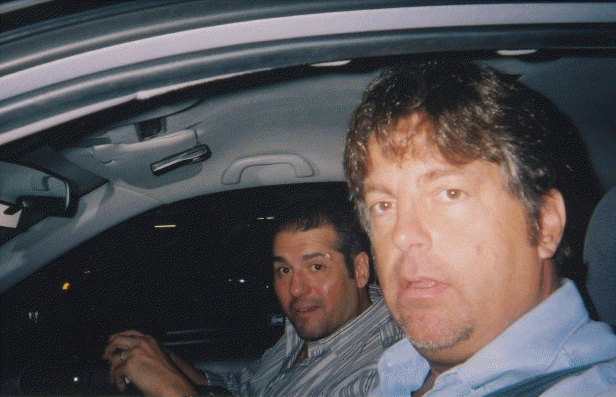
AJ Benza and Neal Gumpel,
after a long day filming "Real Guys Movie Reviews"
Working with AJ Benza
GS How did you and AJ Benza get together?
NG That’s strange story. In the late 1990s, I was on hold, waiting for “Uncoupled” and few other projects to take shape. I hired a manager, Mark Burg, at Evolution Entertainment.
Burg’s a former movie producer, who also managed Charlie Sheen and Farah Fawcett. It was writer, actor, actor and he wanted to add a director, I guess.
One day, Burg tells me he has a new client, a journalist who writes for magazines and has a book. It was AJ Benza. I remembered AJ from New York City and wanted nothing to do with him.
Burg convinces me to talk to AJ. A blind date, with AJ, can we find a way to get along, I guess. Burg tells me AJ wants to write movies, while reminding me I want to write for magazines.
We meet, AJ and I, at a Hollywood bar. We talk about New York City. After a while, we decide to help each other out and, today, are the best of friends.
We’ve written two screenplays. Both screenplays are deep in the unavoidable development bog. Both will surface, if only eventually.
I found the collaboration, of Neal and AJ Benza, magical. Their meshed imaginations always yields amazing stories. It's East coast "street" meets West coast "street," when Gumpel and Benza collaborate. Brilliant."
Howard Lapides
CEO Lapides/Lear, Los Angeles
GS What’s the strength of AJ, in your cooperative work?
NG AJ writes great roles for women. He roams a lot, goes on tangents and such, when he’s writing. I have to reel him back to the script. The result is always good.
GS A lack of discipline is common among the intelligent.
NG Rarely do AJ and I disagree about a script. He brings out the best in people around him. The paring was good, for AJ and me.
GS AJ talks about a post-9/11 cross-country car trip with you.
NG After 9/11, we didn’t know what to do. Both AJ and I are from New York City. The attack hit us hard, where it hurts most.
We, AJ and I, felt we had to do something. On 12 September 2001, we shaved our heads and took off on a cross-country drive to New York City. We didn’t know what else to do, after the World Trade Centre attacks.
AJ had never seen Middle America. The drive opened his eyes. It was good for us, to make that drive across the country.
GS Yes, he talks about the trip a lot.
NG As we driving across the country, AJ keeps saying, “You gotta meet my family. We’re gonna go have pasta, with the family.” He keeps saying he’s from Bensonhurst, in Brooklyn.
I grew up in Port Chester, New York. I know about Brooklyn, Bensonhurst and families. I wondered about my safety. What if I say or do something wrong. Will someone whack me, in a back alley? I’m thankful for my SWG health insurance.
When we get to the home of his parents, where AJ grew up and his sister, Rosalie and her husband, Jack, live next door, it’s in West Islip. The house has a huge lawn, big backyard and a dock. AJ grew up in an upper middle-class town on Long Island.
I figured family, wine and pasta somewhere in Brooklyn. What I got was martins, crab roast and much talk about avenging 9/11. Relieved, I couldn’t stop laughing inside.
This is the other side of AJ. Too few people take time to find this part of him. At school, his friends called him Alfie. If all anyone notices is the surface Alfie, his huge talent, deep sincerity and great sensitivity are untapped. What a loss. What a lavish mistake, Hollywood makes, not recognizing Alfie for what he is and that's exceptionally talented.
GS Isn't that a Hollywood specialty, lavish mistakes?
NG Absolutely.
Future
GS I couldn’t agree more about AJ. What’s the future for Neal Gumpel?
NG I don’t have big goals. I want to write. I’m here in Newburn, North Carolina, with Helen, and I’ll write from here.
I’m not going back to Hollywood. Every day, someone calls to say, “You must move back here. You can hit the ground running.” No, it’s not for me, any more, if it ever was for me.
Hollywood is too much wheel spinning. Writers, who want to write, leave the city. If you have any inclination toward losing your mind, Hollywood is the place to live. Los Angeles, Hollywood and the industry are about enabling and rarely about enabling good.
Hollywood is a prison for [talent] constantly involved in development deals. Whomever options your script or directing skills holds you prisoner. If you have many projects in development, you're a prisoner, with many wardens. I think this is why Neal had to get as far as possible away from Hollywood.
AJ Benza
writer, actor and co-host of "High Stakes Poker"
GS Yes, AJ expresses much the same concerns.
NG After a year in Hollywood, it’s a miracle if you’re not hooked on drugs, clinically depressed, homicidal or all three. Hollywood isn’t a healthy place. A few men and women, those who live on the hill, behind the Chateau Marmont, I guess, handle Hollywood, but most don’t.
My energy is my daughters. I want to be around them. This is my future, my wife, my daughters and writing from North Carolina.
I’ve been away, from my daughters, too much and for too long. I’m also trying to be smart about the movie business. I have too many good screenplays placed with good people, such as Brian Linse and Nick Stagliano, the director. I have too much going on to walk away from it. I have to be patient and wait, but from a distance.
GS Thanks, Neal.
NG Your're welcome.
Click here for a list of all Grub Street Interviews.
Interview edited and condensed for publication.
dr george pollard is a Sociometrician and Social Psychologist at Carleton University, in Ottawa, where he currently conducts research and seminars on "Media and Truth," Social Psychology of Pop Culture and Entertainment as well as umbrella repair.
Click above to tell a friend about this article.
Recommended
- David Simmonds
- Win, Win; Yes, Yes
- Count in a Box
- More AHA News 2

- Sjef Frenken
- A Code for the Road
- Sex (gotcha!)
- Serving Dogs and Cats

- Jennifer Flaten
- I Hate Purses
- Bailing
- Bacon Me Crazy

- M Alan Roberts
- Navidad Negra
- Rich Moments
- Death Arrives

Recommended
- Matt Seinberg
- Fender Benders
- Ever-earlier Holidays
- Wifi Woes

- Streeter Click
- Mission
- Social Effects of COVID
- Amazing Randi

Recommended
- AJ Robinson
- Language Barrier
- Outraged
- All That's Necessary

- Jane Doe
- By the Way
- Buying an Amp
- The Jazz Age

- M Adam Roberts
- Learning to Fly
- Last Stand
- Lessons in the Park

- Ricardo Teixeira
- Harmony
- The Unicorn
- The Future




